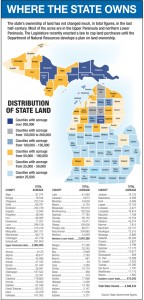DNR's prominence, legislative bill-paying cause angst in Northern Michigan
Shelly Pinkelman lives in an area that could fairly be described as paradise for an outdoor enthusiast.
She can see the Manistee River from her Grayling home and her property in Crawford County abuts thousands of acres of state land where she can ride horses, hike, cross-country ski or ride all-terrain vehicles anytime she wants, free of charge.
"Crawford County is one of the greatest counties to live," said Pinkelman, who is a county commissioner. "It would be a little nicer if we could expand our economy."
Pinkelman said the abundance of state land in Crawford County -- the Michigan Department of Natural Resources owns half the land in the county, about 176,000 acres in all -- is a mixed blessing.
The Au Sable State Forest and other state lands drive Crawford County’s tourism economy, but Pinkelman said it also limits economic development on private land. And she said the Legislature’s failure to pay all of the property taxes due on DNR-owned land in recent years has fueled animosity toward the agency and public lands in general.
"My constituents feel like the state shouldn’t own so much of the land," Pinkelman said. "People are always asking me, ‘Why does the DNR need to own so much?’"
The DNR owns 4.59 million acres of land, or 12 percent of all land in Michigan. Eighty-five percent of DNR land, 3.9 million acres, is -- like Crawford County -- north of Clare.
The DNR and U.S. Forest Service own more than half the land in several Upper Peninsula counties, according to government data. Together, those state and federal agencies own 20 percent of Michigan’s 37 million acres of land.
The Legislature and Gov. Snyder recently approved a land cap law that severely restricted the DNR’s ability to acquire more land for state forests, state parks, game areas, boat launches and recreational trails.
Under the law, the DNR cannot own more than 4.63 million acres of land statewide before 2015 unless the agency submits a land management plan that the Legislature approves. The law also limits DNR ownership of land north of Clare to 3.9 million acres; the agency cannot acquire exceed that limit without the Legislature’s approval.
Sen. Tom Casperson, R-Escanaba, said he introduced the land cap legislation to rein in an agency -- the DNR -- that continues to buy more land when it can’t afford to manage all of the property it already owns. He also wants the DNR to ease restrictions on how people use state land.
Casperson has introduced separate legislation that would increase property tax payments on DNR-owned land. Those bills are awaiting action in the Senate.
Legislative pay practices criticized
Jim Moore, a county commissioner in the Upper Peninsula’s Chippewa County, said he questions the logic behind some of the DNR’s land acquisitions. But he said the most pressing issue is the Legislature’s decision in 2004 to cap property tax payments on DNR-owned land, an act that has resulted in the state making only partial property tax payments since then.
 "I don’t think it’s the public land that everyone is mad about, it’s the fact that the DNR doesn’t pay full property taxes," Moore said. "The DNR is buying all of this land, but they’re not paying the taxes owed on the land they already have."
"I don’t think it’s the public land that everyone is mad about, it’s the fact that the DNR doesn’t pay full property taxes," Moore said. "The DNR is buying all of this land, but they’re not paying the taxes owed on the land they already have."
The DNR fields criticism for the partial property tax payments, but the Legislature decides how much the state pays in property taxes on DNR-owned land, said Sharon Schafer, the DNR’s chief of finance. Since 2008, the Michigan Department of Treasury has handled property tax payments on DNR land.
Tim Kobasic, an avid outdoorsman and writer in Escanaba, said anger over the state’s failure to pay full property taxes on DNR land morphed into what he called a misguided land cap law.
Kobasic disputed claims by Sen. Casperson and others that there is a groundswell of opposition to public lands in the Upper Peninsula.
The influential Upper Peninsula Sportsmen’s Alliance supported the land cap, but Kobasic said several other hunting and fishing organizations in the U.P. passed resolutions opposing the legislation.
"Sen. Casperson is a nice guy and he means well but I think he is getting some very bad advice," Kobasic said. "The land cap was arbitrary and capricious … I think it was a way of gaining control and micro-managing the DNR."
Jeff Alexander is owner of J. Alexander Communications LLC and the author of "Pandora's Locks: The Opening of the Great Lakes - St. Lawrence Seaway." He’s a former staff writer for the Muskegon Chronicle.
See what new members are saying about why they donated to Bridge Michigan:
- “In order for this information to be accurate and unbiased it must be underwritten by its readers, not by special interests.” - Larry S.
- “Not many other media sources report on the topics Bridge does.” - Susan B.
- “Your journalism is outstanding and rare these days.” - Mark S.
If you want to ensure the future of nonpartisan, nonprofit Michigan journalism, please become a member today. You, too, will be asked why you donated and maybe we'll feature your quote next time!


